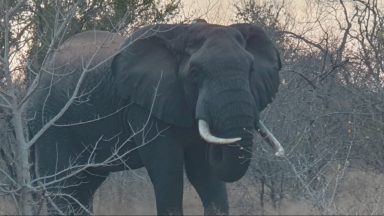Today, history is made as seven critically endangered animals are making the journey from South Africa to Zinave National Park in Mozambique. Here they will become the first resident black rhino in more than four decades. It’s been an incredibly long drive, but thankfully the convoy is accompanied by highly experienced wildlife veterinarians, translocation experts and a security team.
Facing Unforeseen Challenges
As with any large-scale translocation operation, there are often a few unexpected challenges that need to be dealt with along the journey, and this time one of trucks has ground to a halt because of a broken propshaft. As darkness falls, passing motorists are warned about the broken-down truck and a specialised tow truck is swiftly called to help move the truck to a safer location so the crates can be cross-loaded to the backup truck.
With two of the world’s most experienced translocation drivers behind the wheel, the convoy soon gets going again and makes up most of the time lost with the breakdown. Unfortunately, just a few hundred kilometres after crossing the Mozambique border, the truck loses a tyre, which requires changing. Although this sounds like a simple enough task, things get a lot more complicated when carrying seven critically endangered black rhinos. Making sure to not waste a minute, the vets and their teams take the opportunity to water and feed the animals to ensure that the animals are in the best possible condition to tackle the last part of the journey.
The Arrival
Twelve hours and plenty of challenges later, the trucks arrive in Zinave National Park – just as a new day is beginning. The rhinos are soon offloaded and released into small bomas. This is so that the team can monitor each animal for a few hours before they are released into the wild, where they join the 19 white rhino already roaming the sanctuary. All of these incredibly precious animals will be closely tracked, day and night, by a dedicated ranger team.
A Note Of Thanks
Thanks to the joint forces of Exxaro Resources, Mozambique’s National Administration for Conservation Areas (ANAC) and Peace Parks Foundation, a healthy founder population of both black and white rhino now call Zinave home and this national park is a beacon of hope for sustainable conservation!
Peace Parks would like to extend a note of thanks to Conservation Solutions, Mozambique Wildlife Alliance, South Africa’s Department of Forestry, Fisheries and the Environment (DFFE) and the Mozambique Ministry of Land and the Environment, with additional funding provided by the German Postcode Lottery and MAVA Foundation.

